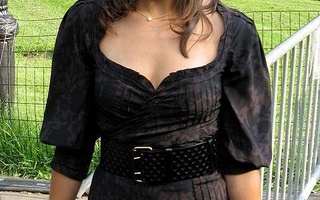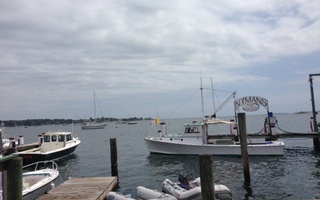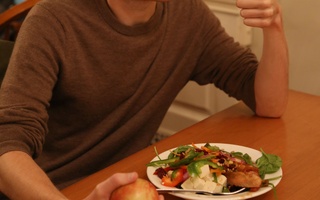John T. Hamilton has the studied look of the stereotypical Harvard professor. Draped in tweed, with a vest underneath and elbow pads on his coat, he puffs insistently on a wooden pipe outside his office in the Department of Comparative Literature.
But before Hamilton picked up Homer and Virgil, he was picking guitar, and long before he came to Cambridge, Rolling Stone magazine had tapped him as an up-and-coming musician. For Hamilton, academia was an afterthought—during the first fifteen years of his adult life, he wrote, performed, and recorded rock music.
“It’s a very similar lifestyle,” Hamilton says nonchalantly.
He leans back in his chair at the kitchen table of his spacious Arlington house, painted purple on the outside. The sounds of drums and electric bass filter in from the basement, where his two sons, ages 11 and 15, are improvising rock riffs.
“Communicating, improvising, trying to sense people’s expectations and trying to meet them—those are all important issues,” he adds.
“It’s definitely not banking,” chimes in his wife Donna from across the table.
“It’s bankrupting,” she laughs.
John and Donna have been together for more than 30 years, but not just as husband and wife—“we’ve shared a life,” Hamilton says. Since meeting in high school, they’ve played in four different bands together, including Tiny Lights—a critically-acclaimed act that toured nationwide and released seven albums between 1983 and 1994.
“It was a really great way to grow up,” says Donna as Hamilton heads down to the basement to make a song request.
‘A HODGE-PODGE’
Dave Dreiwitz saw John and Donna play for the first time at a nightclub in Hoboken when he was 15 years old.
“I thought they were amazing,” he says. John and Donna, both just 18 at the time, were playing with a jazz fusion group called Low Key. “They seemed experienced,” Drewitiz adds.
Dreiwitz, now the bass player for the rock group Ween, became the third founding member of Tiny Lights a year later, in 1983.
“We liked a lot of the same kind of stuff,” Dreiwitz says. “We were all jazz heads.”
But Tiny Lights quickly grew into a group that defied genre, even when it came to instrumentation: Dreiwitz knew trumpet and bass, Donna played violin and sang vocals, and Hamilton wanted to incorporate non-traditional rock instruments.
In 1985, Hamilton invited another member to the band, Jane Scarpantoni. Scarpantoni, who is still in the music industry, has gone on to record with Bruce Springsteen, Sheryl Crow, and Christina Aguilera—on the cello.
“It takes a special bunch of people to let you just go with it and get used to playing in a group,” she says, remembering her transformation from a classical cellist to a rock musician. “Through them, I was able to get used to playing in a rock band.”
But the group was not just a rock band. In a newspaper interview, Hamilton would later describe Tiny Light’s music as “a hodge-podge of 1970s AM radio, folk music, and improvisatory tendencies.”
This mixed bag of sounds seemed to work for Tiny Lights. “A lot of people heard that sound and went: Wow! Strings!” says Scarpantoni. “I think they were a bit ahead of their time.”
The band branched out even further with the addition Andy Demos, a drummer, saxophone player, and talented multi-instrumentalist.
“Tiny Lights was going to be simple, happy, pretty,” Donna says. “We did whatever we wanted to do, basically—kind of like what John does at Harvard,” she ribs, turning to give her husband a cheeky glance. He chuckles.
‘MUSTARD CRUNCH’
After a few years of playing clubs in Hoboken, the group began touring in earnest in 1987, after Hamilton graduated from New York University with a degree in classics and German.
“We toured like mad,” Dreiwitz says. “John would just book these gigs in between working his restaurant job and going to NYU. He was the skipper and the captain and the navigator.”
Hamilton, who worked as a waiter, translator, and guitar teacher to pay the bills, managed all of the tours himself. Tiny Lights, he says, never had an agent or a publicist: “Just a telephone, a press kit, and our latest record.”
“We were a bunch of friends, going on the road, making music,” Scarpantoni recalls. “Sometimes we’d play for two people, and sometimes we’d play for hundreds.”
Concert performances for Tiny Lights were as eclectic as the sound the band would create. Before each show, Hamilton would survey the audience—Donna remembers it as him “feeling out” the crowd—and cue the other band members with a mood to start an improvised introduction. Tiny Lights traveled throughout the country and headlined at the first two South by Southwest Music Festivals in Austin, Texas.
But even as the group members gained recognition, their rock musician lives were far from lucrative. The five bandmates frequently shared one hotel room or slept at campgrounds.
Over a full plate of cookies on the kitchen table, Donna remembers when they had limited options for food. “When we were in the van, traveling at points, we had cereal, we had condiments—”
“So we made mustard crunch, by stirring in the cereal crumbs,” Hamilton interrupts. Both laugh. “In the morning, we found enough change in the bottom of the van to buy a cup of coffee, which we all shared.”
‘WHATEVER HAPPENED TO ROCK AND ROLL?’
Now sipping his very own coffee, Hamilton speaks with cool-headed erudition about the artistry of record-making—the challenge of blending and balancing each track, perfecting each voice with vintage microphones and tape. His eyes flash with interest and intensity when he talks music.
If the wooden pipe he occasionally produces from his coat pocket makes it hard to believe that he once played nightclubs with a rock band, his passion for music is unmistakable. And by most accounts, it always has been.
Hamilton grew up in a modest home in the Bronx, with non-musical, working-class parents. An only child, he taught himself to play guitar on a cheap acoustic.
“Very early on, I had the key to our apartment,” he says. “I found myself alone a lot, so I would read or play music.”
He was soon playing with friends and in church services. In the fourth grade, he wrote a musical called “Whatever Happened to Rock and Roll?” In the play, the protagonist, a young boy, hounds his parents for an electric guitar.
“I was almost screaming for an electric guitar,” Hamilton says. “We put it on at P.S. 119, P.S. 125—it was a little Bronx tour,” he says.
“My parents didn’t even see it. They both worked,” he adds with a chuckle.
Hamilton did get that electric guitar, eventually, and by the time he was in high school, he was playing in a band. Before long, a 16-year-old from another high school asked his group to play a song she had written.
It was Donna, and three months later, they were dating. “It wasn’t really a reflective time,” says Hamilton, trying to recall what sparked the romance. “We became ever closer as friends, working together, talking for hours on the telephone, working together until we finally realized that, you know, it was meant to be.”
STOP THE SUN; I WANT TO GO HOME
For nearly a decade, before and during Tiny Lights, John and Donna remained personal and professional partners.
“They’re almost like one being,” Dreiwitz says. “One feeds the other, and it’s always been like that.”
The two made it official in 1989, tying the knot when Tiny Lights was at its peak. They used their wedding money to buy an unfurnished condo, a far cry from the spacious home in Arlington where they live today. One week after the ceremony, they left for a three-month tour.
Scarpantoni left the group in 1991, and the band spent some time recording in California. There the members recorded their fourth album, “Stop the Sun I Want to Go Home,” in 1992. That same year, Tiny Lights earned a nod from Rolling Stone Magazine.
“Meanwhile, John’s in the van, reading Greek, reading Latin,” Donna remembers. “He’s got attention surplus disorder,” she says affectionately.
“The conversation in the van was not the normal conversation of people who are in a band,” Scarpantoni says, recalling long talks about history, art, and politics on tour drives. “He could discuss anything.”
“On the road, you only play an hour show,” Hamilton says. “The whole day is free to just read.”
Just as Hamilton was delving deeper into what he calls his “extended reading period,” the luster of Tiny Lights was beginning to fade.
“You go back to a place where you’ve played, and the crowd isn’t as big, and maybe you’re just not so into it anymore,” Donna says. “It just starts feeling sad.”
As time went on, Tiny Lights proved unwilling to change its image or its musical repertoire to court popular success. “We put so much emphasis on authenticity and honesty,” Hamilton says with a still-extant trace of artistic indignation. “It wasn’t just a show—we weren’t just performers—and it wasn’t a role we could just put on.”
It grew especially difficult for the band to keep touring and recording after 1994, when Hamilton began his graduate studies. “We just sort of faded out,” he says. Their first son, Jasper, was born in 1996, and Donna started teaching preschool a few years later.
“It’s a new phase of our lives,” Hamilton says, as Henry, their younger son, walks through the kitchen with a set of drumsticks in hand.
‘NEVER TAKEN LESSONS’
Most of the students in Hamilton’s literature seminar did not know about their professor’s history as a rock star—yet few seem shocked by the fact that their European Romanticism professor played in a band for 13 years.
“He has all these great anecdotes, and he makes a lot of musical references,” says Amrita S. Dani ’13. “It wouldn’t surprise me if he did anything.”
While Hamilton does not often bring up his time in the band in his class, the eclecticism that characterized Tiny Lights often shines through in his teaching. He regularly brings cookies to class and sometimes relates Romantic poems to Nirvana lyrics.
“Being in the classroom is a type of performance,” Hamilton says. “There’s a large element of improvisation.”
Long before he came to Harvard, Hamilton’s bandmates recognized his capacity to combine different disciplines.
“He integrates everything into everything that he does,” Scarpantoni says. “It’s not surprising to me that he became a Harvard professor, because in my mind, this guy always was one.”
Though perhaps, as Scarpantoni says, a natural professor, Hamilton still feels at home behind his guitar as well. The bandmates still stay in touch, and Tiny Lights even played a reunion show last year in New York.
“We still jam. We haven’t lost that joy of music,” Scarpantoni says.
Back at the purple house, Hamilton nods his head rhythmically in the bare-walled basement. Jasper sings lead vocals and plucks a bass riff; Henry tops it off with a drum solo.
“They’ve never taken lessons,” Hamilton tries to yell over the din, mostly in vain.
Neither did he.
—Staff writer Jared T. Lucky can be reached at lucky@college.harvard.edu.
Read more in News
Quincy Groundbreaking Marks the Beginning of Renewal















